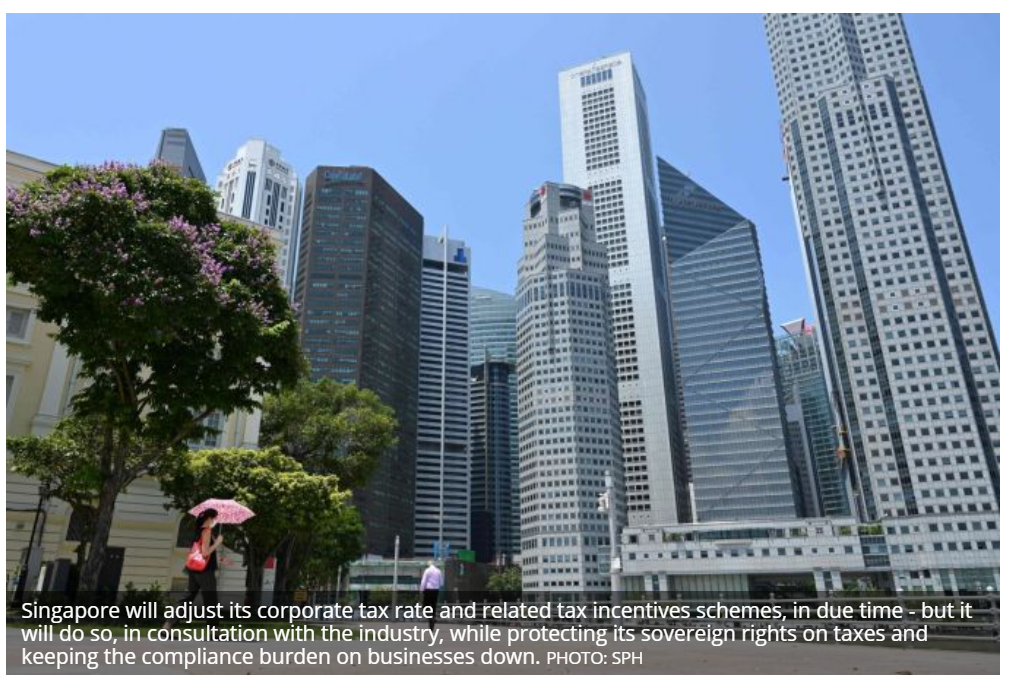Singapore will adjust its corporate tax rate in time, but in consultation with the industry
SINGAPORE will adjust its corporate tax rate and related tax incentives schemes, in due time – but it will do so, in consultation with the industry, while protecting its sovereign rights on taxes and keeping the compliance burden on businesses down, said Minister for Finance Lawrence Wong.
The minister was replying to questions posed in Parliament on Monday, on Singapore’s response to the Group of Seven’s recent agreement on a global minimum tax rate and how that would affect the nation’s competitiveness.
“Singapore has been actively involved in these international discussions as part of the Inclusive Framework or the IF,” he said.
The OECD/G20 Inclusive Framework on base erosion and profit shifting (BEPS) comprises over 130 jurisdictions, collaborating on the implementation of measures to tackle tax avoidance, improve the coherence of international tax rules and ensure a more transparent tax environment.
Mr Wong said the measures being considered by the IF – which fall under two pillars: Pillar One and Pillar Two – would eventually affect Singapore’s corporate income tax revenues, and limit the effectiveness of its tax incentives, respectively.
“However, at this stage, it is still too early to work out the exact impact of these tax proposals. The final number of affected MNEs (multinational enterprises) as well as the extent of the impact depends on the design of the specific rules, which are still being actively discussed at the IF.
“As some of these tax changes can only be effected through a multilateral instrument, there will be a need for an international consensus to be reached before the changes can be implemented.”
He said, therefore, that Singapore will only be able to determine the impact of such measures when the IF has worked through and agreed on the detailed design elements of both pillars and when it can observe how companies and other governments respond to these international developments.
“What we can say for certain is that, when a consensus is fully reached, Singapore will adjust our corporate tax system as needed in consultation with the industry.
“Any adjustments to our tax system will be guided by three key principles: First, we will abide by internationally agreed standards; second, we will safeguard our taxing rights; and third, we will seek to minimise the compliance burden for businesses.
“Ultimately, the best response to these tax changes is to continue to strengthen our overall competitiveness,” he added. “While a conducive tax environment has been helpful in attracting investments, it is not the decisive factor.
“Having quality infrastructure, good connectivity, a skilled workforce and an open and business-friendly regime founded on the rule of law are all far more important factors. We must therefore double down on these competitive strengths. In particular, the government has been investing and will continue to invest in enterprise capabilities, including innovation and digitalisation and in the skills of our workforce.”
Picking up on this point was Minister for Trade and Industry Gan Kim Yong, who said: “We are redoubling our efforts to enhance our competitiveness and improve our business environment, for example through updating our Industry Transformation Maps.”
He added that Singapore will continue to invest in its infrastructure to allow companies to operate in a very cost-effective manner, and that it would extend the nation’s connectivity through more free trade agreements, while looking for new opportunities for other types of trade agreements, such as those involving renewable energy and the digital economy.
“Over the last few weeks since I took on the job, I’ve been talking to our counterparts in other countries almost on a daily basis, to develop new connections to allow our companies to expand beyond the confines and the limitations of our physical size.
“We will also want to encourage companies to invest in productivity and upgrading so that they can continue to be cost effective,” Mr Gan said.
He pointed to the numerous support and incentives schemes available in Singapore, but acknowledged that the country would not remain static in its efforts. “If we stop where we are and hope that we will continue to thrive and to be vibrant, I think it will be in trouble. We have to constantly be on the move, look out for opportunities, continue to restructure, reorganise and reposition ourselves for new opportunities that will come our way.”
Source: https://www.businesstimes.com.sg/government-economy/singapore-will-adjust-its-corporate-tax-rate-in-time-but-in-consultation-with-the


 Thailand
Thailand




